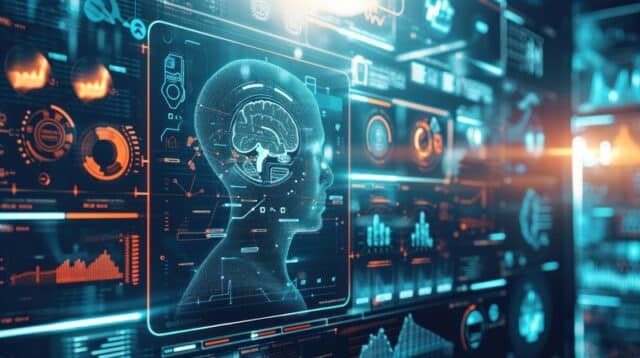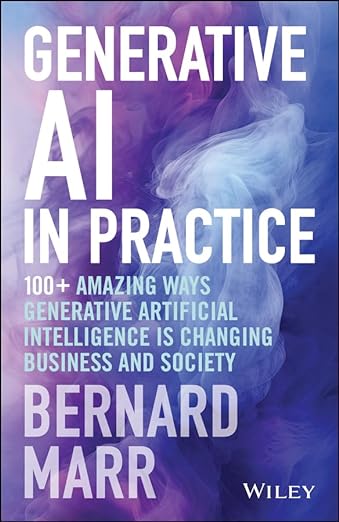How GenAI is changing business and society [Q&A]

Generative AI started out as a bit of a novelty, allowing you to create writing or artwork based on simple prompts. But increasingly it's having an impact on many areas of the world, from writing code to composing music and aiding research.
In a new book, Generative AI in Practice: 100+ Amazing Ways Generative Artificial Intelligence is Changing Business and Society, futurist and thought leader Bernard Marr takes a closer look at the impact of GenAI. We talked to him to find out more.
BN: Could generative AI be one of the most groundbreaking technologies we've ever developed?
BM: Absolutely, generative AI is poised to be one of the most groundbreaking technologies we've ever developed. Its ability to generate new content -- whether that's text, images, music, or even complex simulations -- opens up unprecedented opportunities for creativity, efficiency, and problem-solving. This technology can perform tasks that were previously thought to be exclusively within the realm of human capabilities, such as creative writing and artistic creation, making it a transformative force across many domains. For instance, in research and development, generative AI can simulate numerous scenarios and outcomes, significantly speeding up the innovation process. Additionally, its potential to automate routine tasks allows professionals to focus on more strategic and creative aspects of their work, thus enhancing productivity and innovation across various fields.
BN: Which sectors are seeing the influence of AI most?
BM: Generative AI is making significant inroads across a variety of sectors. In healthcare, it's being used to create personalized treatment plans and assist in medical research by generating hypotheses and analyzing data at a scale and speed that humans cannot match. This can lead to quicker discoveries of new treatments and more effective patient care. In finance, AI is improving risk assessment, fraud detection, and customer service through intelligent chatbots that can handle customer inquiries and transactions more efficiently. The entertainment industry is also being revolutionized, with AI helping to create music, scripts, and even entire virtual worlds, providing new forms of content and experiences. Additionally, education is seeing AI-driven personalized learning experiences that adapt to individual student needs, and marketing is leveraging AI for hyper-personalized customer interactions and content generation, which can significantly improve engagement and conversion rates.
BN: How can we address concerns around deepfakes, misinformation, etc?
BM: Addressing concerns around deepfakes and misinformation requires a multi-faceted approach. First, we need robust technical solutions that can detect and flag AI-generated content. This involves developing advanced algorithms and tools that can identify inconsistencies and traces of AI manipulation. Second, there should be clear regulatory frameworks and guidelines that govern the ethical use of AI technologies. These regulations should mandate transparency in AI-generated content, requiring clear labeling and accountability. Third, public awareness and education are crucial. People need to be informed about the potential for AI to create false information and how to critically evaluate the content they encounter. Collaboration between tech companies, governments, and educational institutions is essential to create a comprehensive strategy against these risks. Furthermore, investment in continuous research to stay ahead of malicious actors who may exploit AI is necessary to ensure long-term effectiveness.
BN: Isn't there a risk of harm to creative pursuits like writing and musical composition?
BM: There is certainly a concern that generative AI might disrupt traditional creative pursuits. However, I believe AI can also serve as a powerful tool for artists and writers. Instead of replacing human creativity, AI can augment it by offering new perspectives, generating ideas, and automating repetitive tasks. This allows creatives to focus more on the aspects of their work that require a human touch -- emotion, nuance, and storytelling. Additionally, AI can democratize creativity by providing tools and resources to individuals who may not have had access to traditional artistic training. For example, an aspiring musician without formal training can use AI to compose music, opening up new avenues for artistic expression and discovery. The key is to view AI as a collaborator rather than a competitor in the creative process.
BN: How can we ensure that the benefits of generative AI are distributed equitably across different socio-economic groups?
BM: As generative AI becomes more prevalent, it is essential to address the digital divide and ensure its benefits are accessible to all. This involves investing in education to teach AI literacy, building digital infrastructure in underserved areas, and creating inclusive AI solutions that consider the needs of diverse populations. Public-private partnerships can accelerate the deployment of AI benefits, while policies promoting digital inclusion and protecting against bias are crucial. Engaging directly with communities to understand their specific needs and empowering local leaders and organizations can create tailored programs that address unique barriers. By implementing these strategies, we can work towards a more equitable distribution of the benefits of generative AI, ensuring it serves as a tool for inclusion and empowerment.
BN: How do you think we'll see generative AI evolve in the next few years?
BM: In the next few years, generative AI will become more sophisticated and integrated into various aspects of our lives. We will see advancements in its ability to understand context and produce more coherent and relevant outputs. AI will become more accessible, with user-friendly interfaces that allow people with no technical background to harness its power. We can also expect to see generative AI playing a crucial role in solving complex global challenges, such as climate change, by simulating scenarios and generating innovative solutions. Moreover, as AI ethics and governance frameworks evolve, we will develop better ways to manage the risks associated with AI, ensuring it is used responsibly and for the benefit of all. Businesses will increasingly adopt AI to drive efficiency and innovation, and we might even see AI-generated content becoming a standard in media and entertainment. The possibilities are truly vast and exciting.

Image Credit: Irinayeryomina / Dreamstime.com
